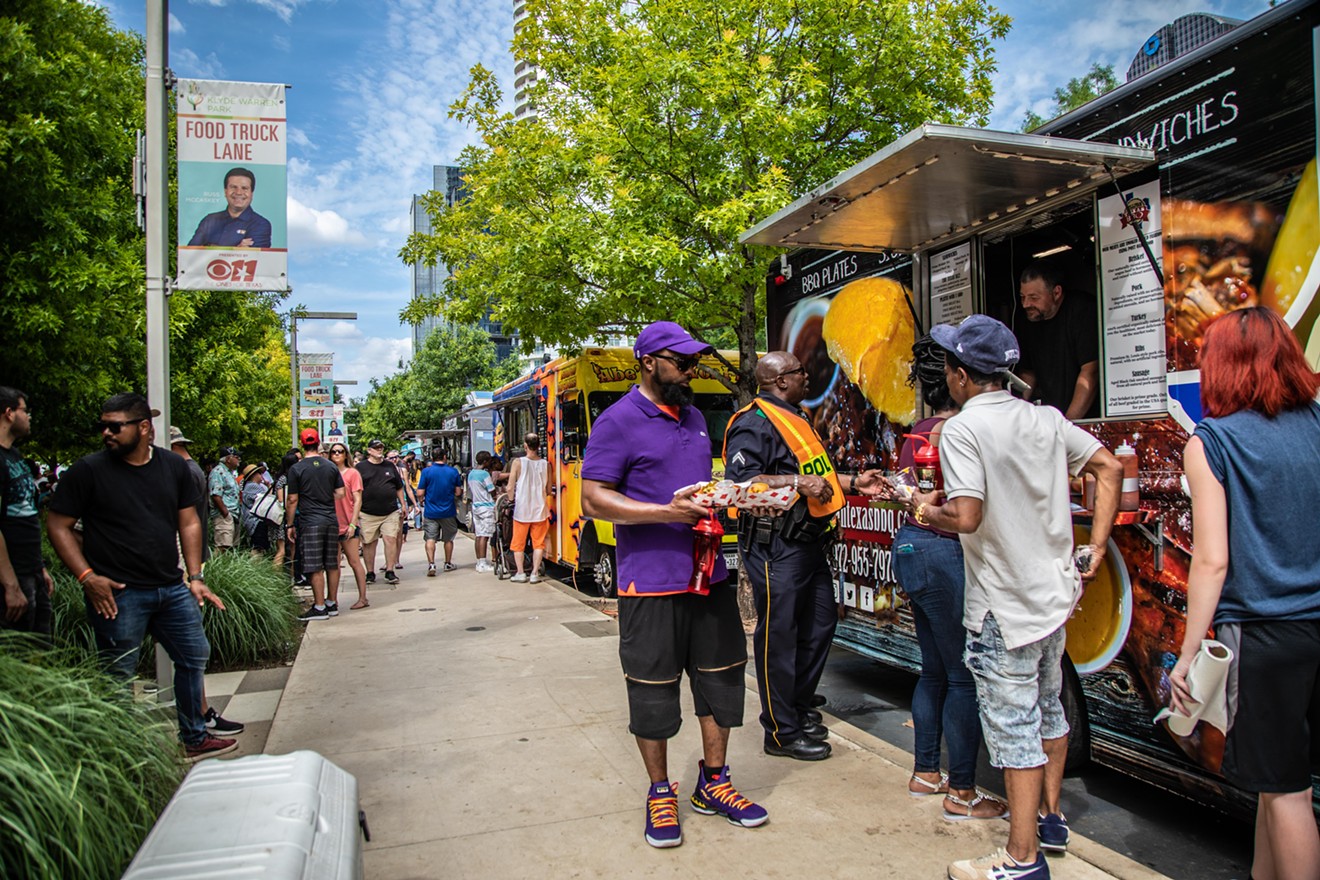But 2020 can be even better. Here are five immodest suggestions for how various food-industry leaders can build on Dallas’ culinary success in the new year.
For Dallas Politicians, Part One:
Reform the Laws that Hold Our Food Scene BackIf we want our food scene to be one of America’s best, we’re going to need to get local politicians on our side. Dallas city law is, in many ways, harshly anti-food. If you’ve ever gone to a city such as Austin or Portland, Oregon, and enjoyed the food truck (or cart) plazas there, you might be wondering why Dallas’ food truck scene is almost totally restricted to brewery pop-ups and Klyde Warren Park. The answer: regulations and restrictions that suppress mobile startups.
@ChadWestDallas @LeeforDallas @caraathome @VoteAdamMedrano Y'all like good food, entrepreneurship, small businesses, and extra taxes for the city right? Help out your hungry constituents and unleash a whole new set of entrepreneurs by reforming the Mobile Food Units rules!
— Nathaniel Barrett (@ncoxbarrett) November 12, 2019
Another politician-induced burden: restrictions on farmers markets. Where are all the neighborhood produce stands? They’ve been erased by big grocery stores; it seems moneyed political forces have worked against small farmers markets in our city. Yes, downtown Dallas does have an extensive farmers market, but if you haven’t visited lately, it’s mostly a collection of stores, restaurants and luxury apartments, not an actual vegetable market.
Dallas City Council can also easily pass a “Scores on the Doors” law, which would ask restaurants to post health inspection grades in their windows, the way they do in New York City and Las Vegas. Studies show that such a law reduces foodborne illness and increases compliance with safety laws.
For Diners:
Return to a Place You LoveIn most cities, food writers urge their readers to try something new. But in Dallas, we’re at the opposite end of the spectrum. Several times this year, a beloved restaurant closed and I realized with sadness that I just hadn’t gone back enough.
Munchiez, the Korean burger joint in Carrollton; Zaytinya, the upscale Turkish spot in Frisco; Sichuan kitchen Tasty House in Plano; Small Brewpub, Oak Cliff’s pilsner-powered hangout; Mesa, with its seafood enchiladas just down the street from Small; and Cuban sandwich spot C Senor. Those are just some of the spots we could have supported more while they were around.
This Christmas season, I’ve been going back to some restaurants that I long assumed were too popular and busy for me to find a seat. Instead, they’ve all been uncrowded, even part-empty. Don’t assume that just because everyone praises a restaurant, it must be making tons of money. If you love a place, go back.

Proposed permanent mausoleum to contain cremains of VisitDallas in honor and perpetuity.
Woodall Rodgers Park Foundation
For Dallas Politicians, Part Two:
Get Rid of VisitDallasChefs around town have told me, off the record, that they feel unsupported by Dallas’ official tourism bureau. Tourism boards in other cities have done remarkable jobs promoting their dining and drinking, but VisitDallas has a dire track record on that front, including an incident in which it promoted a suburban Tex-Mex restaurant that had been closed for two years.
VisitDallas’ biggest publicity push for Dallas food and drink has been the “Margarita Mile,” a campaign invented in spring 2018 to promote our iconic frozen invention. Almost two years later, the Margarita Mile remains more or less the only official mechanism for promoting a culinary scene that's now recognized as one of the most diverse, exciting and fast-growing in the United States.
The case against VisitDallas is, of course, not all about food. Its former executives apparently used the organization as a personal expense account, it has no real track record of success and it is now demanding a shiny new headquarters in Klyde Warren Park to continue doing no obvious work.
But just as getting rid of VisitDallas and starting over would help our tourism picture in general, so would it help our restaurant scene gain recognition nationally for something other than frozen drinks.
For Food Writers:
Get Outside the BubbleWe in the food writing community need to spend more time outside the neighborhoods of downtown, Uptown, Deep Ellum, Bishop Arts and the Park Cities. My own personal New Year’s resolution is to head south and west, investigating food in South Dallas, DeSoto, Duncanville and Grand Prairie.
Not every major restaurant opening is accompanied by press releases and glamorous photography. Eve Hill-Agnus at D Magazine has done great work investigating cuisines such as Indian and Filipino; Amy McCarthy at Eater has reported diligently on new Korean restaurants. Here’s hoping other writers can follow their examples.
On a related note, following the departure from Dallas of talented writers like Gustavo Contreras and Stephanie Kuo, our local food writers are remarkably un-diverse. In 2020, publications — including this one — need to focus on finding new writing talent from a variety of backgrounds.
For Developers and Landlords:
Take a Chance on Something NewIn case you guys haven’t noticed, Dallasites are growing more and more willing to try new things and support unusual, homegrown concepts. Maybe you don’t need to fill all of the ground-floor retail spots in your shiny new apartment complex with national yogurt franchises.
Yes, the restaurant business is hard, and yes, many of our city’s most exciting talents are comparatively inexperienced or backed by minimal capital. But, and feel free to call me an optimist here, talent is winning out these days. Attention is coming from across the country. And the whole city can’t stop spending money on food. Try nurturing a restaurant concept because it’s simply a darn good idea.
If the real estate and finance sectors continue to put barriers in the way of small, locally owned concepts, especially those from minority communities, then we might have to get the politicians involved here, too, by offering landlords incentives for supporting local entrepreneurs over yet another Starbucks.
And, as we’ve already seen on this list, nobody wants to involve the politicians.















